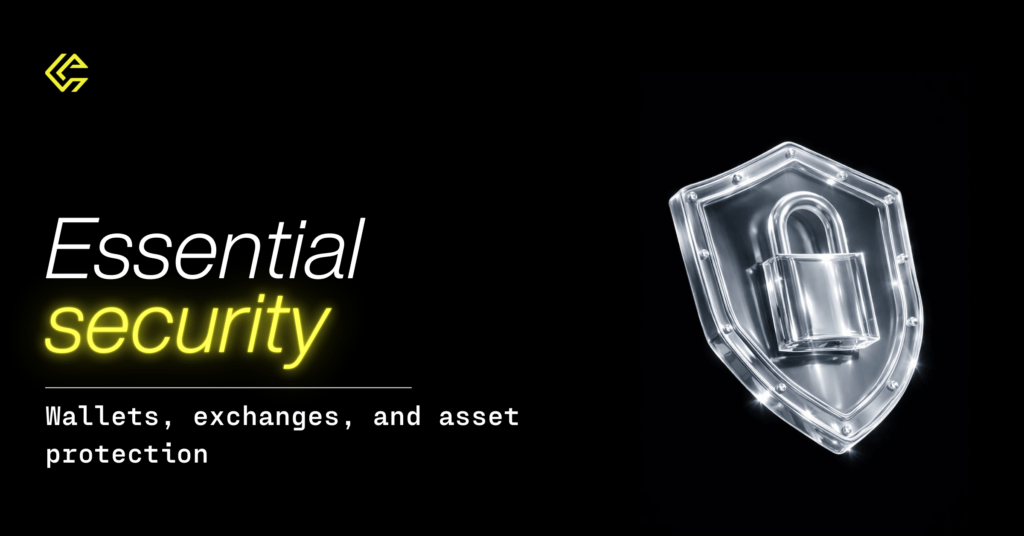
Essential security for Wallets, exchanges and asset protection
The cryptocurrency market offers incredible opportunities for traders and investors, but with these opportunities come security risks. Hacks, scams, and exchange failures have cost users billions of dollars. Understanding how to secure your digital assets is crucial to avoiding potential losses. In this article, we’ll cover essential security practices, including how to properly use wallets, safely interact with exchanges, and protect your crypto assets.
Understanding wallets: the first line of defense.
Cryptocurrency wallets are tools that store your private keys, allowing you to access and manage your digital assets. A private key is essentially the password that grants full control over your funds. Losing it means losing access to your cryptocurrency, while exposing it can lead to theft.
Types of cryptocurrency wallets.
There are two primary types of wallets: hot wallets and cold wallets.
HOT WALLETS (Online Wallets)
Hot wallets are connected to the internet, making them highly accessible but also more vulnerable to cyber threats. These wallets are commonly used for frequent transactions and quick access to funds.
Types of hot wallets:
- Mobile wallets: Apps like Trust Wallet and MetaMask allow you to store, send, and receive crypto easily.
- Web wallets: Provided by exchanges such as Binance or Coinbase, web wallets allow direct access to assets but require strong security measures.
- Desktop wallets: Software-based wallets like Electrum or Exodus offer better control over private keys while still being connected to the internet.
Security tips for hot wallets:
- Enable two-factor authentication (2FA) for added security.
- Never store large amounts of cryptocurrency in hot wallets; use them only for daily transactions.
- Keep your private keys offline or encrypted to prevent exposure to hacks.
COLD WALLETS (Offline Wallets)
Cold wallets store private keys offline, significantly reducing exposure to hacks. These are ideal for long-term storage of cryptocurrencies.
Types of cold wallets:
- Hardware wallets: Physical devices like Ledger Nano X and Trezor securely store private keys offline.
- Paper wallets: A printed document containing your public and private keys, ensuring complete offline security.
Security tips for hot wallets:
- Store hardware wallets in a safe place, away from potential physical damage or theft.
- Create multiple backups of your recovery phrase and store them securely.
- Regularly check for firmware updates to ensure protection against new security threats.
Choosing the Right Wallet: For daily trading, a hot wallet might be suitable. For long-term storage, a cold wallet is the best option.
Using exchanges safely.
Cryptocurrency exchanges are platforms where users buy, sell, and trade digital assets. However, not all exchanges offer the same level of security.
How to choose a secure exchange
- Regulation & reputation: Look for exchanges with strong security records and proper regulatory compliance.
- Security features: Ensure the exchange offers 2FA, withdrawal whitelists, and cold storage for funds.
- Insurance policies: Some exchanges offer insurance coverage in case of hacks.
Best practices for exchange security
- Avoid keeping large balances on exchanges: Exchanges can be hacked, so only keep funds necessary for trading.
- Use strong passwords and 2FA: Never reuse passwords across different platforms.
- Withdraw profits to a secure wallet: Always transfer profits to a private wallet for better protection.
Protecting your crypto assets.
Security goes beyond choosing the right wallet or exchange. Here are key practices to protect your holdings:
- Backup your private keys and seed phrases
- Write down your recovery phrase and store it in a safe place.
- Never store private keys digitally or share them online.
- Beware of scams and phishing attacks
- Always verify URLs before logging into an exchange.
- Do not trust unsolicited messages offering free crypto or investment opportunities.
- Stay Updated on Security Threats
- Follow reputable crypto security sources to stay informed about the latest threats.
- Regularly update your wallet software to patch vulnerabilities.
- Use a Hardware Wallet for Large Holdings
- If you hold significant funds, a hardware wallet is the safest way to store them.
- Consider Multi-Signature Wallets
- Multi-signature wallets require multiple private keys to approve transactions, adding an extra layer of security for large holdings.
Security in proprietary trading with CFT.
While traders on Crypto Fund Trader (CFT) do not handle real cryptocurrencies, security remains crucial. CFT ensures a safe trading environment by implementing the following:
- Account Protection: 2FA, encrypted login credentials, and restricted withdrawal settings.
- Platform Security: Continuous monitoring for suspicious activity and fraud prevention.
- No direct crypto holdings: Since CFT traders work with simulated capital, they do not risk losing personal funds to exchange hacks.
Even though you are not holding real cryptocurrencies, maintaining strong security habits such as using unique passwords and avoiding phishing attempts is essential to protecting your trading account.
Conclusion.
Security is one of the most important aspects of crypto trading and investing. By using secure wallets, choosing trustworthy exchanges, and following best security practices, you can significantly reduce the risk of losing your assets. Additionally, when trading on platforms like Crypto Fund Trader (CFT), ensuring account security remains a priority.
Join our community and start your educational process today!